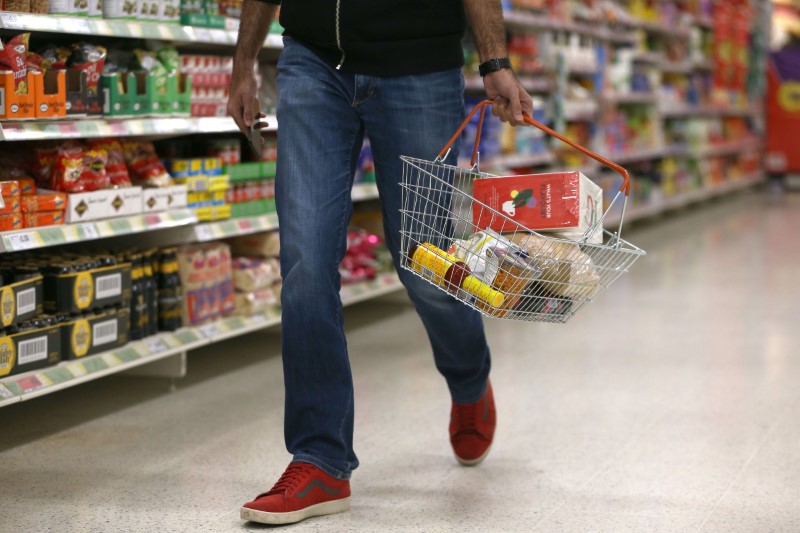By William Schomberg and David Milliken
LONDON (Reuters) - British inflation unexpectedly jumped to its highest level in nearly four years in May, tightening the squeeze on consumers who now face the added worry of political uncertainty after last week's inconclusive election.
The impact of the fall in the pound since last year's Brexit vote made itself felt as the higher costs of foreign holidays and of imported computer games and equipment helped push up consumer prices by 2.9 percent year-on-year.
That was its biggest annual increase since June 2013, the Office for National Statistics said, and was above the median forecast of 2.7 percent in a Reuters poll of economists.
It is also faster than the growth in pay for most people who have suffered a squeeze on their incomes almost without break for a decade.
Data due to be released on Wednesday is likely to show basic pay rose by an annual 2.0 percent in the three months to April, according to another Reuters poll.
Prime Minister Theresa May, weakened by the loss of her parliamentary majority in the election, has accepted that voters' patience with austerity is at an end, the Times reported on Tuesday.
Despite the stronger-than-expected consumer price inflation figures, the pound fell slightly after the ONS data, possibly reflecting a slowing of the surge in prices faced by factories which hints at slower inflation ahead for households.
Paul Hollingsworth, an economist with Capital Economics, said he believed the data showed the drop in the pound has fed through into inflation more quickly than expected.
"While we think that CPI inflation will peak at a little above 3 percent before the end of this year, it is likely to drop back fairly quickly in 2018," he said.
The ONS said one of the main drivers for inflation in May was the increased cost of package holidays abroad for British tourists who have to pay more for their euros and dollars.
Another big push on prices came from computer games and equipment, which are typically imported and therefore reflect the diminished buying power of sterling since the Brexit vote.
Inflation has picked up speed broadly around the world but in Britain there is extra pressure from the fall in sterling, contributing to a sharp slowdown in British economic growth since the start of this year.
Credit card firm Visa said on Monday it saw the first annual fall in spending by consumers in nearly four years in May.
That was before last week's shock election result that has raised questions about how May will advance her plans to take Britain out of the European Union, and push other legislation.
A survey of executives published on Monday showed business confidence plunging after the election.
FACTORY COSTS SURGE EASING
Despite the sharp rise in prices, the Bank of England is widely expected to keep interest rates at their record low of 0.25 percent when it announces its latest monetary policy decision on Thursday.
The BoE has said it will tolerate inflation above its target of 2 percent because so far there has been no knock-on effect on pay which could generate a longer-lasting inflation problem.
But the BoE had previously said it only expected inflation to reach the kind of levels it has now hit at the end of this year.
Some economists have said Britain's political turmoil is likely to make the BoE more cautious about considering a rate hike and could even lead it to revive its massive bond-buying program if the economy weakens further.
The BoE was also likely to take comfort from the data which showed inflationary pressures might be easing.
Input prices for factories fell by 1.3 percent in month-on-month terms in May, taking the yearly rate of price growth down to 11.6 percent from a downwardly revised 15.6 percent in April, its slowest annual growth rate since last September.
Growth in prices charged by factories held steady at an annual 3.6 percent, in line with the Reuters poll.

For a graphic on UK inflation, click http://pdf.reuters.com/pdfnews/pdfnews.asp?i=43059c3bf0e37541&u=